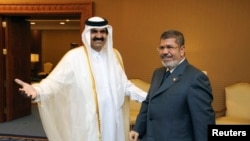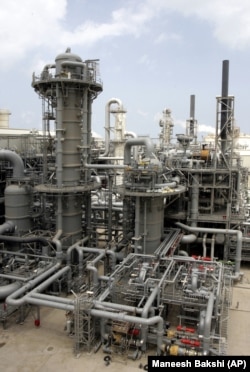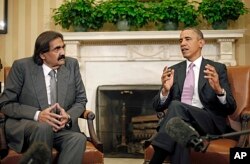WASHINGTON, DC —
The tiny oil-rich nation of Qatar is emerging as a major behind-the-scenes player in the Middle East following the Arab Spring uprisings. It has managed this by pumping billions of dollars into Tunisia, to jihadist fighters in Libya and to the new Muslim Brotherhood government in Egypt. Some regional analysts worry Doha may end up buying the very sovereignty of the governments it supports. Others fear Qatar is looking to spread political Islam across the region.
Political prominence
Twenty-five billion barrels of proven oil reserves and the world’s third-largest natural gas reserves have given Qatar the highest per capita income on the globe—nearly $103,000 per household. With money to burn, Qatar is investing heavily across the globe.
“I think the key motivation for Qatar is political ambition,” said Lina Khatib, who heads the Arab Reform and Democracy Program at Stanford University. “Qatar wants to be seen as one of the major—if not the major—political brokers in the Middle East, and this ambition motivates Qatar to try to have a stake in whatever conflicts the region faces, as well as try to influence the political processes and actors, especially right now in countries in transition.”
But investing in the Arab Spring nations isn’t Qatar’s first political foray. It has mediated conflicts in Lebanon, Sudan and Yemen and has dispensed aid throughout Middle East and beyond—even to victims of America’s 2005 Hurricane Katrina.
“This is part of Qatar’s aim to influence political processes while appearing neutral,” Khatib said. “And that involves basically working with multiple political actors who may sometimes be in conflict with one another or share even widely different political agendas.”
That would certainly explain seeming incongruities in Qatar policy--such as sharing the world’s biggest natural gas field with Iran or paying for a football stadium in Israel.
Simon Henderson, a scholar at The Washington Institute and director of its Gulf and Energy Policy Program, suggests Qatar is simply taking advantage of an opportunity.
“They see in the Middle East that Egypt, which used to be one of the main leaders, has declining energy and certainly very little money to play a very major role, and Saudi Arabia, which does have the money, is ruled by a very old King…and apparently at the moment seems to lack the energy to maintain its paramount leadership role,” said Henderson. “And so Qatar is competing, particularly with Saudi Arabia, to achieve a greater diplomatic and political prominence in the Middle East.”
Religious Imperialism or self-preservation?
Some critics accuse Qatar of working to install and support Islamist governments across the Middle East.
Bernard Haykel, professor of Near Eastern Studies at Princeton University, rejects that idea. “I believe that its policy, which is driven almost exclusively by its emir, the leader of Qatar, is to basically make Qatar valuable—or important, if you’d like—in the region by having a key role as a mediator, as a sponsor, as a patron for different political forces, especially the Muslim Brotherhood, a movement that it has been cultivating since the 1950s,” he said.
That said, Haykel rejects the idea that Qatar is looking to spread any particular form of Islamic extremism. “I think it’s just doing it out of what it sees as its pragmatic national self-interest, which is just to have very strong connections with powerful and dominant political forces throughout the region and then, through them, seem even more important to the outside world.”
He points to Doha’s sponsorship of the Egyptian Islamist, Sheikh Yusuf al-Qaradawi. By giving Qaradawi an outlet on the Al Jazeera channel, Qatar ensures the loyalty of the Muslim Brotherhood.
But what about Qatar’s support of Islamists in Libya or jihadist fighters in Syria? Stanford University’s Khatib says Qatar is motivated by the need to protect itself.
“Qatar perceives groups like the Muslim Brotherhood as allies and wants to maintain influencing those allies,” she said. “Aid is a way to maintain a degree of power over those groups. At the same time, when it comes to other Islamist groups that are of a more, let’s say, non-moderate leaning, Qatar’s support of those groups—again, it’s not because it wants to promote them as much as it is interested in controlling them and keeping the danger away from its own borders.”
Exposing Islamism?
Tawfik Hamid is a Senior Fellow and Chair for the Study of Islamic Radicalism at the Potomac Institute for Policy Studies and the author of Inside Jihad: Understanding and Confronting Radical Islam. He suggests that by supporting the Muslim Brotherhood, Qatar is actually working against religious extremism.
“In the case of Egypt, Qatar’s support is generous, but only to the extent that it might prevent complete economic collapse, not ensure the long-term building of Egypt,” Hamid said. In other words, the Muslim Brotherhood is being allowed to demonstrate its political inefficiency.
“And when it fails in Egypt, the mother country, the birthplace of the Muslim Brotherhood, the biggest Arab and Muslim country with al-Azhar there [Islam’s oldest religious institution], this will be the biggest blow to political Islam globally,” he said.
As for Syria and Libya, Hamid, a former member of the militant al-Gama'a al-Islamiyya who now works to advance peaceful Islam, believes Qatar may be supporting jihadists for intelligence reasons.
“When you support someone, it becomes easier to know their secrets, to know whether they have anything to do with al-Qaeda or not and to have more information about their money-laundering, their connections,” he said.
Beyond that, Hamid suggests another motive: Jihadists, who are Sunni, could someday prove useful to Qatar.
“The support for these jihadi and Islamist groups may be part of a defense mechanism against the Iranian influence in the region—they are so worried about the Shi’a in the region,” he said of Qatar.
“Maybe Qatar sees that if there is ever a confrontation with Iran, they will need a lot of soldiers, a lot of jihadists under their control to protect Qatar, to deter Iran from attacking.”
Qatar insists it isn’t looking for attention or to interfere in regional politics. During his recent trip to Washington, Qatari Prime Minister Hamad bin Khalifa Al Thani insisted Qatar is only working on behalf of the people of the Arab Spring and supporting the choices they have made.
...Qatar is competing, particularly with Saudi Arabia, to achieve a greater diplomatic and political prominence in the Middle East.Simon Henderson, The Washington Institute Gulf and Energy Policy Program
Twenty-five billion barrels of proven oil reserves and the world’s third-largest natural gas reserves have given Qatar the highest per capita income on the globe—nearly $103,000 per household. With money to burn, Qatar is investing heavily across the globe.
“I think the key motivation for Qatar is political ambition,” said Lina Khatib, who heads the Arab Reform and Democracy Program at Stanford University. “Qatar wants to be seen as one of the major—if not the major—political brokers in the Middle East, and this ambition motivates Qatar to try to have a stake in whatever conflicts the region faces, as well as try to influence the political processes and actors, especially right now in countries in transition.”
But investing in the Arab Spring nations isn’t Qatar’s first political foray. It has mediated conflicts in Lebanon, Sudan and Yemen and has dispensed aid throughout Middle East and beyond—even to victims of America’s 2005 Hurricane Katrina.
“This is part of Qatar’s aim to influence political processes while appearing neutral,” Khatib said. “And that involves basically working with multiple political actors who may sometimes be in conflict with one another or share even widely different political agendas.”
That would certainly explain seeming incongruities in Qatar policy--such as sharing the world’s biggest natural gas field with Iran or paying for a football stadium in Israel.
Simon Henderson, a scholar at The Washington Institute and director of its Gulf and Energy Policy Program, suggests Qatar is simply taking advantage of an opportunity.
“They see in the Middle East that Egypt, which used to be one of the main leaders, has declining energy and certainly very little money to play a very major role, and Saudi Arabia, which does have the money, is ruled by a very old King…and apparently at the moment seems to lack the energy to maintain its paramount leadership role,” said Henderson. “And so Qatar is competing, particularly with Saudi Arabia, to achieve a greater diplomatic and political prominence in the Middle East.”
Religious Imperialism or self-preservation?
Some critics accuse Qatar of working to install and support Islamist governments across the Middle East.
Bernard Haykel, professor of Near Eastern Studies at Princeton University, rejects that idea. “I believe that its policy, which is driven almost exclusively by its emir, the leader of Qatar, is to basically make Qatar valuable—or important, if you’d like—in the region by having a key role as a mediator, as a sponsor, as a patron for different political forces, especially the Muslim Brotherhood, a movement that it has been cultivating since the 1950s,” he said.
That said, Haykel rejects the idea that Qatar is looking to spread any particular form of Islamic extremism. “I think it’s just doing it out of what it sees as its pragmatic national self-interest, which is just to have very strong connections with powerful and dominant political forces throughout the region and then, through them, seem even more important to the outside world.”
He points to Doha’s sponsorship of the Egyptian Islamist, Sheikh Yusuf al-Qaradawi. By giving Qaradawi an outlet on the Al Jazeera channel, Qatar ensures the loyalty of the Muslim Brotherhood.
But what about Qatar’s support of Islamists in Libya or jihadist fighters in Syria? Stanford University’s Khatib says Qatar is motivated by the need to protect itself.
“Qatar perceives groups like the Muslim Brotherhood as allies and wants to maintain influencing those allies,” she said. “Aid is a way to maintain a degree of power over those groups. At the same time, when it comes to other Islamist groups that are of a more, let’s say, non-moderate leaning, Qatar’s support of those groups—again, it’s not because it wants to promote them as much as it is interested in controlling them and keeping the danger away from its own borders.”
When you support someone, it becomes easier to know their secrets, to know whether they have anything to do with al-Qaeda or not and to have more information about their money-laundering, their connections...Tawfik Hamid, Potomac Institute
Exposing Islamism?
Tawfik Hamid is a Senior Fellow and Chair for the Study of Islamic Radicalism at the Potomac Institute for Policy Studies and the author of Inside Jihad: Understanding and Confronting Radical Islam. He suggests that by supporting the Muslim Brotherhood, Qatar is actually working against religious extremism.
“In the case of Egypt, Qatar’s support is generous, but only to the extent that it might prevent complete economic collapse, not ensure the long-term building of Egypt,” Hamid said. In other words, the Muslim Brotherhood is being allowed to demonstrate its political inefficiency.
“And when it fails in Egypt, the mother country, the birthplace of the Muslim Brotherhood, the biggest Arab and Muslim country with al-Azhar there [Islam’s oldest religious institution], this will be the biggest blow to political Islam globally,” he said.
As for Syria and Libya, Hamid, a former member of the militant al-Gama'a al-Islamiyya who now works to advance peaceful Islam, believes Qatar may be supporting jihadists for intelligence reasons.
“When you support someone, it becomes easier to know their secrets, to know whether they have anything to do with al-Qaeda or not and to have more information about their money-laundering, their connections,” he said.
Beyond that, Hamid suggests another motive: Jihadists, who are Sunni, could someday prove useful to Qatar.
“The support for these jihadi and Islamist groups may be part of a defense mechanism against the Iranian influence in the region—they are so worried about the Shi’a in the region,” he said of Qatar.
“Maybe Qatar sees that if there is ever a confrontation with Iran, they will need a lot of soldiers, a lot of jihadists under their control to protect Qatar, to deter Iran from attacking.”
Qatar insists it isn’t looking for attention or to interfere in regional politics. During his recent trip to Washington, Qatari Prime Minister Hamad bin Khalifa Al Thani insisted Qatar is only working on behalf of the people of the Arab Spring and supporting the choices they have made.







